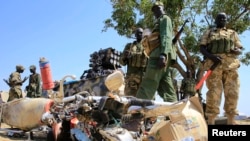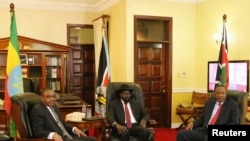TORIT, SOUTH SUDAN —
As clashes continue around South Sudan, even states that have managed to remain peaceful are feeling the effects of 12 days of unrest with food, fuel and even mobile phone airtime starting to run out and prices rising sharply.
No fighting has been reported in the Eastern Equatoria town of Torit, but resident Lagu James Thomas says he has not been able to make any phone calls since Monday.
“I asked for airtime. I found that airtime for two pounds has raised to three pounds, and for five pounds, it is six pounds... Now it is not even there in the market,” he told VOA News.
Because he has been unable to buy minutes for his phone, Thomas has not been able to contact family members who live in Juba, where hundreds were killed when the clashes first erupted on Dec. 15 in what President Salva Kiir said was a bid to oust him, led by former Vice President Riek Machar.
Thomas said that, in addition to the rising prices of phone airtime, Torit residents are beginning to see shortages in the town's markets of fruits and vegetables, which have to be trucked in from Juba, 214 kilometers away.
Torr Majuor, who supplies telephone airtime cards to shops around Torit, said he has not been able to get supplies from Juba since the fighting began, and not for lack of trying.
“We ordered from Juba. They refused to give us the cards,” he said.
Because phone companies "are fearing of the incidents that have happened in Juba," Majuor said, they have refused to send new batches of airtime cards to Torit, even though the town and the state of Eastern Equatoria have remained peaceful throughout the strife.
The companies' fear is that "if they send, they may lose the airtime on the way," because all goods have to be shipped by road to Torit from Juba "because we don't have any plane," Majuor said.
Residents have reported seeing groups of armed men near the road leading to Eastern Equatoria state from the South Sudanese capital, which is in neighboring Central Equatoria.
The price hikes have impacted South Sudanese in other ways, too.
Primary school teacher Angelina Jacob was supposed to spend Christmas in Juba, but when she arrived at the bus depot on Tuesday morning, she found she could no longer afford the fare, which had more than doubled on Christmas Eve to 150 pounds from the 60 pounds she used to pay.
Marko Kwirino, the head of the state Drivers’ Union, warned that prices for all forms of transport, including local buses, will continue to rise as fuel shortages caused by the fighting push the cost of gasoline and diesel up.
“These days, there is no fuel," he said.
"People on the black market are selling 20 liters for 200 to 250 pounds... In Torit, we are running short on fuel,” Kwirino said.
Some shops have been able to keep prices down, but shopkeepers warned that will change if the fighting does not stop soon.
As Kiir met Thursday in Juba with African officials including Kenyan President Uhuru Kenyatta and Ethiopian Prime Minister Hailemariam Desalegn to try to chart a way out of the crisis, rebel forces loyal to Machar said they are ready to hold talks with the government, on condition that 11 politicians who were detained when the troubles began are released from jail.
The government has so far said it will not release the 11.
After regional African leaders met in Nairobi on Friday to discuss the unrest in South Sudan, Kenyatta said there is a "very small window of opportunity to secure peace" in the world's newest nation, where more than 1,000 people have been killed and tens of thousands displaced in nearly two weeks of fighting.
The head of the U.N. Mission in South Sudan (UNMISS), Hilde Johnson, said in a video news conference Thursday that the unrest threatened South Sudan's very nationhood and called on the country's leaders to urgently take steps to restore peace.
No fighting has been reported in the Eastern Equatoria town of Torit, but resident Lagu James Thomas says he has not been able to make any phone calls since Monday.
“I asked for airtime. I found that airtime for two pounds has raised to three pounds, and for five pounds, it is six pounds... Now it is not even there in the market,” he told VOA News.
Because he has been unable to buy minutes for his phone, Thomas has not been able to contact family members who live in Juba, where hundreds were killed when the clashes first erupted on Dec. 15 in what President Salva Kiir said was a bid to oust him, led by former Vice President Riek Machar.
Thomas said that, in addition to the rising prices of phone airtime, Torit residents are beginning to see shortages in the town's markets of fruits and vegetables, which have to be trucked in from Juba, 214 kilometers away.
Torr Majuor, who supplies telephone airtime cards to shops around Torit, said he has not been able to get supplies from Juba since the fighting began, and not for lack of trying.
“We ordered from Juba. They refused to give us the cards,” he said.
Because phone companies "are fearing of the incidents that have happened in Juba," Majuor said, they have refused to send new batches of airtime cards to Torit, even though the town and the state of Eastern Equatoria have remained peaceful throughout the strife.
The companies' fear is that "if they send, they may lose the airtime on the way," because all goods have to be shipped by road to Torit from Juba "because we don't have any plane," Majuor said.
Residents have reported seeing groups of armed men near the road leading to Eastern Equatoria state from the South Sudanese capital, which is in neighboring Central Equatoria.
The price hikes have impacted South Sudanese in other ways, too.
Primary school teacher Angelina Jacob was supposed to spend Christmas in Juba, but when she arrived at the bus depot on Tuesday morning, she found she could no longer afford the fare, which had more than doubled on Christmas Eve to 150 pounds from the 60 pounds she used to pay.
Marko Kwirino, the head of the state Drivers’ Union, warned that prices for all forms of transport, including local buses, will continue to rise as fuel shortages caused by the fighting push the cost of gasoline and diesel up.
“These days, there is no fuel," he said.
"People on the black market are selling 20 liters for 200 to 250 pounds... In Torit, we are running short on fuel,” Kwirino said.
Some shops have been able to keep prices down, but shopkeepers warned that will change if the fighting does not stop soon.
As Kiir met Thursday in Juba with African officials including Kenyan President Uhuru Kenyatta and Ethiopian Prime Minister Hailemariam Desalegn to try to chart a way out of the crisis, rebel forces loyal to Machar said they are ready to hold talks with the government, on condition that 11 politicians who were detained when the troubles began are released from jail.
The government has so far said it will not release the 11.
After regional African leaders met in Nairobi on Friday to discuss the unrest in South Sudan, Kenyatta said there is a "very small window of opportunity to secure peace" in the world's newest nation, where more than 1,000 people have been killed and tens of thousands displaced in nearly two weeks of fighting.
The head of the U.N. Mission in South Sudan (UNMISS), Hilde Johnson, said in a video news conference Thursday that the unrest threatened South Sudan's very nationhood and called on the country's leaders to urgently take steps to restore peace.

